The AMD 2nd Gen Ryzen Deep Dive: The 2700X, 2700, 2600X, and 2600 Tested
by Ian Cutress on April 19, 2018 9:00 AM ESTCPU Office Tests
The office programs we use for benchmarking aren't specific programs per-se, but industry standard tests that hold weight with professionals. The goal of these tests is to use an array of software and techniques that a typical office user might encounter, such as video conferencing, document editing, architectural modelling, and so on and so forth.
All of our benchmark results can also be found in our benchmark engine, Bench.
Chromium Compile (v56)
Our new compilation test uses Windows 10 Pro, VS Community 2015.3 with the Win10 SDK to combile a nightly build of Chromium. We've fixed the test for a build in late March 2017, and we run a fresh full compile in our test. Compilation is the typical example given of a variable threaded workload - some of the compile and linking is linear, whereas other parts are multithreaded.
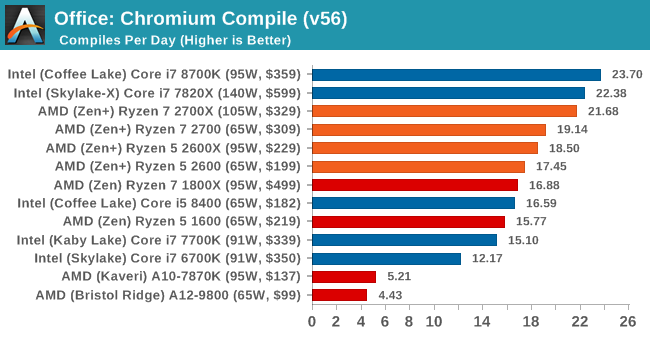
Having redone our compile testing, we can see that the new Ryzen-2000 series parts do provide a good uplift over the first generation, likely due to the decreased cache latencies and better precision boost. Performance per dollar between the 8700K and the 2700X would seem to be about equal as well.
PCMark8: link
Despite originally coming out in 2008/2009, Futuremark has maintained PCMark8 to remain relevant in 2017. On the scale of complicated tasks, PCMark focuses more on the low-to-mid range of professional workloads, making it a good indicator for what people consider 'office' work. We run the benchmark from the commandline in 'conventional' mode, meaning C++ over OpenCL, to remove the graphics card from the equation and focus purely on the CPU. PCMark8 offers Home, Work and Creative workloads, with some software tests shared and others unique to each benchmark set.
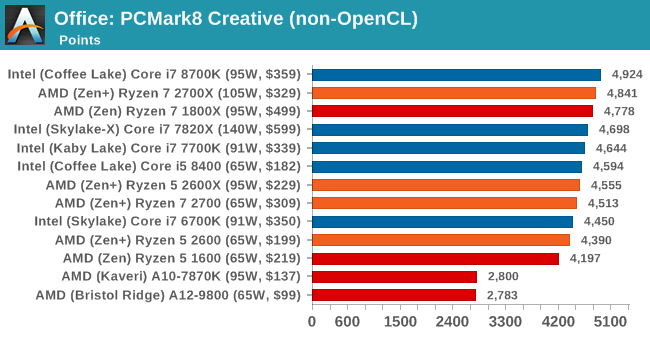
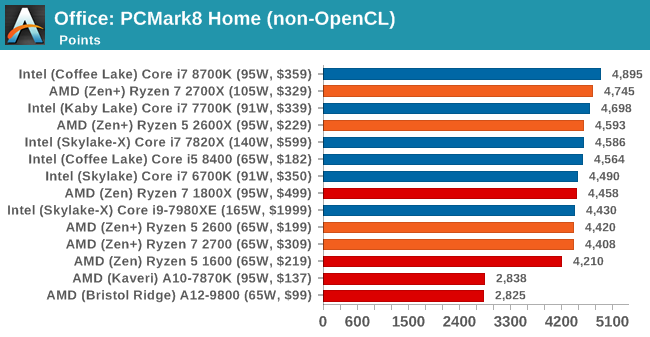

PCMark 10
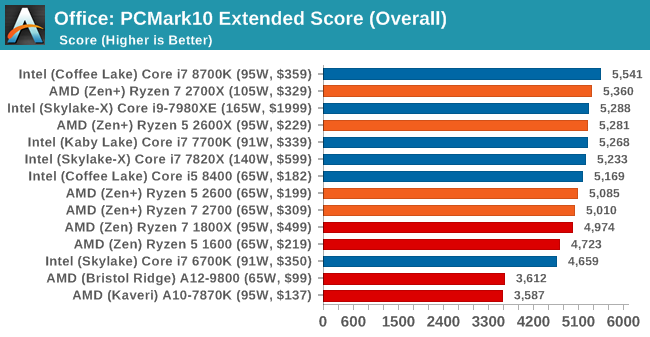
GeekBench4
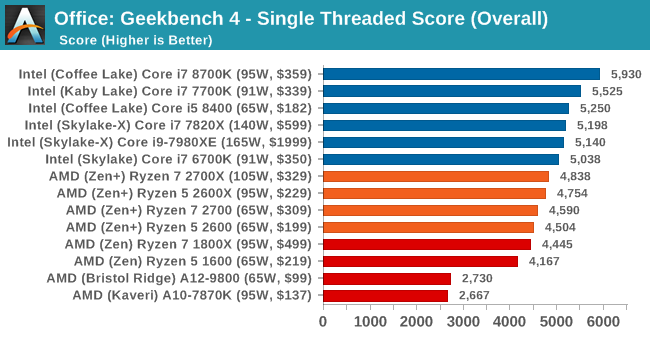
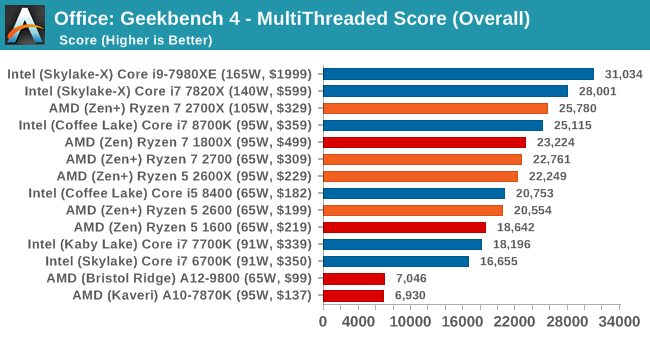
If you live and breathe GeekBench 4, then the single threaded results put Intel firmly in first place. For the multi-threaded tests, the top Intel and AMD mainstream parts are going at it almost neck-and-neck, however it is clear that the previous generation quad-cores are falling behind.










545 Comments
View All Comments
spdragoo - Thursday, April 19, 2018 - link
Per Tom's Hardware (https://www.tomshardware.com/reviews/amd-ryzen-7-2..."Our test rigs now include Meltdown And Spectre Variant 1 mitigations. Spectre Variant 2 requires both motherboard firmware/microcode and operating system patches. We have installed the operating system patches for Variant 2.
Today's performance measurements do not include Intel's motherboard firmware mitigations for Spectre Variant 2 though, as we've been waiting for AMD patches to level the playing field. Last week, AMD announced that it’s making the mitigations available to motherboard vendors and OEMs, which the company says should take time to appear in the wild. We checked MSI's website for firmware updates applicable to our X370 platforms when AMD made its announcement, but no new BIOSes were available (and still aren't).
Unfortunately, we were only made aware that Variant 2 mitigations are present in our X470 board's firmware just before launch, precluding us from re-testing the Intel platforms with patches applied. We're working on this now, and plan to post updated results in future reviews.
The lack of Spectre Variant 2 patches in our Intel results likely give the Core CPUs a slight advantage over AMD's patched platforms. But the performance difference should be minimal with modern processors."
For those that are TL:DR in their viewpoint: unlike Anandtech, TH did NOT include all of the Spectre/Meltdown patches, & even said that there might be differences in their test results.
Chris113q - Thursday, April 19, 2018 - link
Other reviewers also had their setups meltdown/spectre patched and it's been already confirmed that these patches don't greatly impact gaming performance at all.It's clear that Anandtech's results are wrong here. I have read 12 other reviews and most of their results differ from the ones you got. You'd have to be delusional to take just 1 review as the absolute truth.
Ninjawithagun - Thursday, April 19, 2018 - link
Incorrect. Those reviews were conducted back in January 2018 (look at the review dates). Microsoft issued new patches for Meltdown and Spectre earier this month (April 2018). I could find no other performance review showing performance gain/loss for Intel CPUs based upon the new patches other than the one posted now by AnandTech.Ninjawithagun - Thursday, April 19, 2018 - link
The only way to know for sure is for each hardware reviewer to provide the exact version of Windows 10 they used for testing. This will prove whether or not they ran benchmarks with the most current Windows updates/patches.Intel999 - Thursday, April 19, 2018 - link
It is plausible that many reviewers were lazy and carried over data from earlier reviews on Intel and 1000 series Ryzen CPUs.Thank you Anandtech for doing aa genuinely unbiased review that required a great deal of extra work compared to others.
5080 - Thursday, April 19, 2018 - link
And don't forget BIOS patches as well. If you have a fully patched system the impact is even bigger than just updating with the Windows KB patches.sor - Thursday, April 19, 2018 - link
Looking at Tom’s results, they have OC intels in first place. Other than that it’s damn close. Is there a chance you’re just browsing graphs to see who is in the top spot and not really comprehending the results?Aside from that, the test setups and even benchmarks used are different. You owe Ian an apology for not realizing you’re comparing OC results to his.
Silma - Thursday, April 19, 2018 - link
Yes. Ian is a top reviewer. At worst he made a mistake in this evaluations. It happens to the best of us.However, I have an issue with non OC test. It seems to me people will purchase overclockable processors and graphic cards to overclock them. At least game results should probably be based on OC benchmarks.
pogostick - Thursday, April 19, 2018 - link
@Silma No, it makes more sense to do it this way. Everyone who buys these processors are guaranteed to have a part that will run the manufacturer spec. OC is a random lottery.ACE76 - Thursday, April 19, 2018 - link
Wrong... majority of even gamers DON'T overclock...that us relagated to a niche market of enthusiasts.